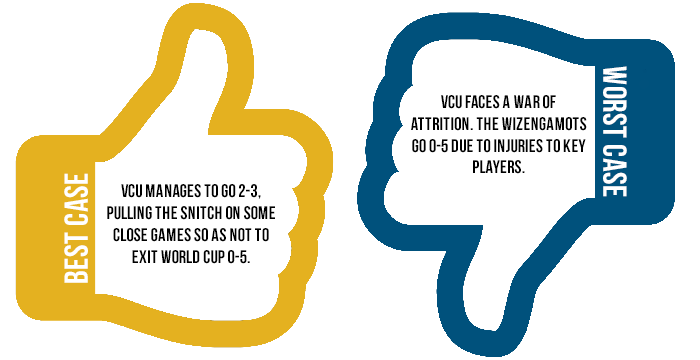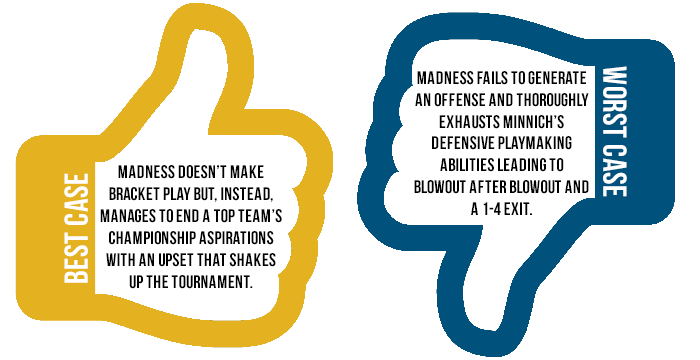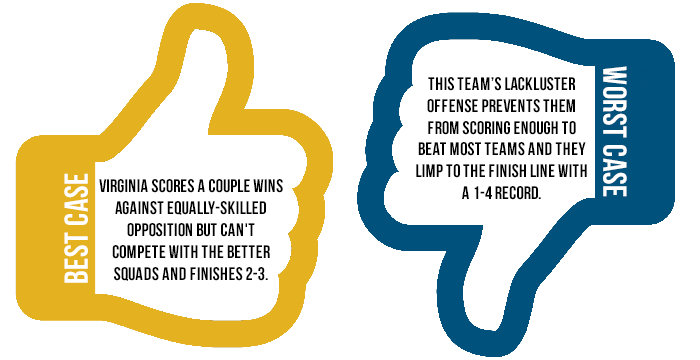Antwerp QC, Much of Belgian Core, Leaves Competitive Quidditch
Rock Hill Roll Call is your in-depth guide to the 80 teams that will compete for the title of World Cup 8 Champion. We’ve reached out to writers and analysts all over the country to bring you the lineups, strategies, focal points and aspirations of each and every attending team. Whether you are looking for a leg up on the competition or just want a detailed preview of the sport’s main event, this is the place for you.
 By Casey Schmidt
By Casey Schmidt
Upon the mention of the VCU Wizengamots, the first name that typically pops up is that of Darren Creary, and rightfully so. Despite receiving just an honorable mention in the Mid-Atlantic All Tournament team this past fall, Creary is the epitome of a game changer. His absence on the field due to injury last season played a pivotal role in the Wizengamot’s failure to qualify for World Cup VII, and his return has sparked new life into a team that was sinking. Smart and athletic with an incredible wingspan, Creary not only brings his size but visibly bolsters his team’s confidence.
With Lee Reid and Todd Zimmerman maintaining size at keeper, VCU has transitioned Creary to chaser this season, utilizing him as keeper only when absolutely necessary. An impossible offensive threat to ignore, Creary creates a size mismatch on defense for the majority of chasers in the game and becomes a deadly force behind the hoops if given space. This move alsos allow other members of VCU’s speedy and experienced chaser core, such as August Wade, Dan Newton, Tommy McPhail and the perennially tenacious Lisa Revette, to shine as well. Prior to the switch, the chasers often defaulted to resetting the ball to keeper if the first pass did not result in a score. Creary now grants the team a comfortable outlet to keep the play alive.
If Creary can stay healthy and present long enough for Reid, Zimmerman and the rest of the team to settle comfortably into a developed strategy, VCU’s offensive production could see a marked improvement.
 By Casey Schmidt
By Casey Schmidt
For VCU to succeed at World Cup VIII, it will need to find an effective strategy that does not rely on a few key players on defense. While Reid and Zimmerman have the size to block long shots, both drives and quick passing penetrate the defense easily as neither keeper has exceptional mobility. When they have bludger control, VCU uses one of those bludgers to cover the open chaser. Unfortunately, that beater often becomes over-committed and, against teams with aggressive offensive beaters, this strategy can backfire, opening up wide driving lanes down the center as the top beater is taken out. To staunch the flow of points, VCU’s chasers will have to step up their physicality with more effective tackles and play tighter on their man-to-man defense.
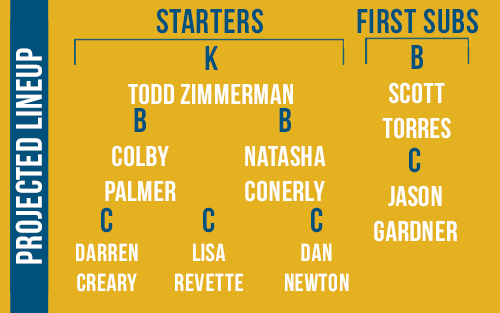 An effective defense will hopefully compensate for VCU’s offensive struggles as well. The team has averaged 40 quaffle points per game against other World Cup-qualified teams, winning just one of those ten games (against George Mason University) and keeping only two others within snitch range. With a lock-down defense, VCU will be able to keep more games in range and some lucky snitch grabs could snag them some clutch victories.
An effective defense will hopefully compensate for VCU’s offensive struggles as well. The team has averaged 40 quaffle points per game against other World Cup-qualified teams, winning just one of those ten games (against George Mason University) and keeping only two others within snitch range. With a lock-down defense, VCU will be able to keep more games in range and some lucky snitch grabs could snag them some clutch victories.
VCU should not be completely written off due to some early season shortcomings. In past years, the team has made it to bracket play of World Cup preceded by less-than-stellar overall seasons due to their ability to adapt well to out-of-region teams. It will be this ability that will define this half of the season for VCU as they reevaluate their strategy on their way to World Cup.
 By Max Miceli
By Max Miceli
This is completely irrelevant, but can we take a moment to appreciate how mad this team was by being a team based in our nation’s “Capitol” and calling themselves “Capital” Madness?
OK, now we can talk about quidditch.
They don’t call themselves Madness without reason. They may not have a plethora of athletes or a ton of experienced veterans, but they find a way. With coach and former team USA keeper James Hicks running the ship, if nothing else the team is at least strategically sound. What will make or break their weekend in Rock Hill will be the consistency of the team’s role players.
All too frequently, Hicks writes up a sound game plan, but the game turns into star chaser Steve Minnich being forced to compensate for others’ mistakes, exhausting the savvy former University of Richmond Spider.
It’s not like the team is incapable of playing mistake free. They managed to play the two-time Mid-Atlantic Regional Champion, University of Maryland, in a snitch-range game at the recent regional championship by channeling their inner Tufts University and using a strategy that regional runner-up UNC would later replicate in their own match against the Terrapins.
The odds of this team making it into the bracket is slim to none, but if Madness can become more disciplined, Hicks’ strategies will win games. This probably won’t get them into bracket play, but it will give them a chance to keep a better team out of brackets and, in turn, create a little madness in Rock Hill.
 By Anonymous
By Anonymous
Think about the most rag-tag group of quidditch players you have ever played against. Now include mercenary teams and fantasy teams. Really, picture the most rag-tag group you can recall. I promise you the team you have in mind is not as rag-tag as Capital Madness.
This group is an eclectic assortment of kids who just want to play. They openly express their inability to win games and, when they do, they are just as surprised as their onlookers.
It is not like they are incapable.  They haveformer University of Maryland Terrapin and NYDC Capitalist Hicks coaching. They have a wily veteran in Minnich chasing. They have George Mason University coach Robby May keeping. They have a few pieces.
They haveformer University of Maryland Terrapin and NYDC Capitalist Hicks coaching. They have a wily veteran in Minnich chasing. They have George Mason University coach Robby May keeping. They have a few pieces.
But only a few.
There is only so much Minnich can do on the pitch, and there’s only so much strategy Hicks can install. At the end of the day, the team will slow ball you if you like to run in transition; switch in and out of dual male beating sets when necessary; mix in different defensive schemes; and hope they can catch the snitch if they manage to stay in range.
The formula is not perfect because they do not have the perfect personnel, but they are a group of kids who honestly do not seem to care. They are just trying to have fun, and if they manage to take out a top-tier team along the way, that’s all the better.
 By Max Miceli
By Max Miceli
University of Virginia may be physically smaller in comparison with its World-Cup competition, but for what the team lacks in size, it makes up for in discipline. With a unique defensive scheme, the team regularly finds a way to keep even well-fueled offenses to lower scores than they are accustomed. What will make or break Virginia’s time in Rock Hill, though, is the team’s ability to finish plays on offense and put points on the board.
The Whomping Wahoos try to predicate their offense around a strong combination of passing and cutting, but they find little success in doing so because few to none of their chasers have the finishing ability requisite to take over a game.
In 17 games this season, against a weak Mid-Atlantic schedule, Virginia has only managed to score more than 100 quaffle points in two different games. That will not be enough to thrive at World Cup 8, especially when you consider the fact that those games were against two teams that didn’t qualify: Lock Haven University and Carnegie Mellon University.
Credit goes to their coaching for realizing they do not have strong drivers, but their passing game has, thus far, been unable to crack even the most notoriously lackluster defenses, including that of an early-season UNC. The Whomping Wahoos only managed to score 20 points against the Tar Heels at Minerva Cup.
While the team managed to find more success recently, scoring 70 points against an even more lethargic UNC defense than usual, they will need to match that output every game at World Cup to see any success.
If this team wants to make their mark in April, they will need to find a way to score more than 40 points against day-one teams like George Mason University—as happened in a regional qualifier they lost.
 By Anonymous
By Anonymous
I’m glad this byline is “anonymous” because I get to say things like this: Virginia is one of the most irritating teams I’ve ever played…
In all the right ways. These kids aren’t big, but they play smart.
Virginia’s offense might not be overly impressive, but they have one of the first defenses I’ve ever played against that was permeable and willing to make significant, in-game adjustments.
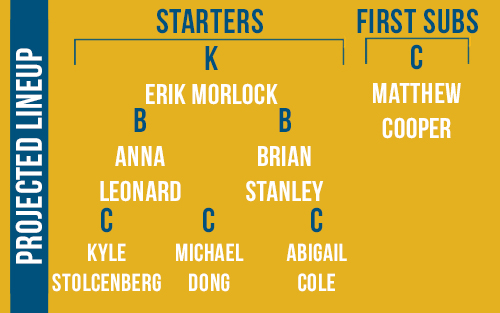 With a chaser as their point defender, the Whomping Wahoos typically have a quick-sliding chaser close behind. This frees up their beaters to play back and knock off passing options if the opposing offense isn’t drive heavy, as they did with relative success against University of Maryland at Turtle Cup. If Virginia plays against a team with strong drivers who can take on multiple defenders, they aren’t afraid to bring up their beater to force the ball out of the hands of a team’s strongest ball carrier.
With a chaser as their point defender, the Whomping Wahoos typically have a quick-sliding chaser close behind. This frees up their beaters to play back and knock off passing options if the opposing offense isn’t drive heavy, as they did with relative success against University of Maryland at Turtle Cup. If Virginia plays against a team with strong drivers who can take on multiple defenders, they aren’t afraid to bring up their beater to force the ball out of the hands of a team’s strongest ball carrier.
While this is usually how the Whomping Wahoos start games, once they notice a team’s tendencies, they’ll tweak the defense to account for any offensive strengths and weaknesses.
Despite this discipline, it’ll be tough for the Wahoos to stick with the most athletic teams for full games. This was made most apparent at Turtle Cup when they managed to stall Maryland’s offense for the majority of game, but ended up giving up 70 quaffle points as the game wore on. The Terrapins’ athleticism and ability to attack Virginia’s defense in different ways was ultimately too much for the Wahoos to handle.
Archives by Month:
- May 2023
- April 2023
- April 2022
- January 2021
- October 2020
- September 2020
- July 2020
- May 2020
- April 2020
- March 2020
- February 2020
- January 2020
- December 2019
- November 2019
- October 2019
- August 2019
- April 2019
- March 2019
- February 2019
- January 2019
- November 2018
- October 2018
- September 2018
- August 2018
- July 2018
- June 2018
- April 2018
- March 2018
- February 2018
- January 2018
- November 2017
- October 2017
- July 2017
- June 2017
- May 2017
- April 2017
- March 2017
- February 2017
- January 2017
- December 2016
- November 2016
- October 2016
- September 2016
- August 2016
- July 2016
- June 2016
- May 2016
- April 2016
- March 2016
- February 2016
- January 2016
- December 2015
- November 2015
- October 2015
- September 2015
- August 2015
- July 2015
- June 2015
- May 2015
- April 2015
- March 2015
- February 2015
- January 2015
- December 2014
- November 2014
- October 2014
- September 2014
- August 2014
- July 2014
- May 2014
- April 2014
- March 2014
- February 2014
- January 2014
- November 2013
- October 2013
- September 2013
- August 2013
- July 2013
- June 2013
- May 2013
- April 2013
- March 2013
- February 2013
- January 2013
- December 2012
- November 2012
- October 2012
Archives by Subject:
- Categories
- Awards
- College/Community Split
- Column
- Community Teams
- Countdown to Columbia
- DIY
- Drills
- Elo Rankings
- Fantasy Fantasy Tournaments
- Game & Tournament Reports
- General
- History Of
- International
- IQA World Cup
- Major League Quidditch
- March Madness
- Matches of the Decade
- Monday Water Cooler
- News
- Positional Strategy
- Press Release
- Profiles
- Quidditch Australia
- Rankings Wrap-Up
- Referees
- Rock Hill Roll Call
- Rules and Policy
- Statistic
- Strategy
- Team Management
- Team USA
- The Pitch
- The Quidditch Lens
- Top 10 College
- Top 10 Community
- Top 20
- Uncategorized
- US Quarantine Cup
- US Quidditch Cup



